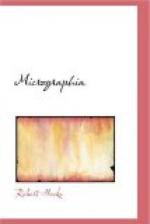this hypothesis, there are many Examples
found in Natural Historians, of Springs
that do ebb and flow like the Sea: As particularly,
those recorded by the Learned Camden, and after
him by Speed, to be found in this Island:
One of which, they relate to be on the Top of a Mountain,
by the small Village Kilken in Flintshire,
Maris aemulus qui statis temporibus suos evomit
& resorbet Aquas; Which at certain times riseth
and falleth after the manner of the Sea. A Second
in Caermardenshire, near Caermarden,
at a place called Cantred Bichan; Qui (ut
scribit Giraldus) naturali die bis undis deficiens,
& toties exuberans, marinas imitatur instabilitates;
That twice in four and twenty hours ebbing and flowing;
resembleth the unstable motions of the Sea. The
Phaenomena of which two may be easily made out,
by supposing the Cavern, by which they are
fed, to arise from the bottom of the next Sea.
A Third, is a Well upon the River Ogmore in
Glamorganshire, and near unto Newton,
of which Camden relates himself to be certified,
by a Letter from a Learned Friend of his that observed
it, Fons abest hinc, &c. The Letter is a little
too long to be inserted, but the substance is this;
That this Well ebbs and flows quite contrary to the
flowing and ebbing of the Sea in those parts:
for ’tis almost empty at Full Sea, but full
at Low water. This may happen from the Channel
by which it is supplied, which may come from the bottom
of a Sea very remote from those parts, and where the
Tides are much differing from those of the approximate
shores. A Fourth, lies in Westmorland,
near the River Leder; Qui instar Euripi
saepius in die reciprocantibus undis fluit & refluit,
which ebbs and flows many times a day. This may
proceed from its being supplyed from many Channels,
coming from several parts of the Sea, lying sufficiently
distant asunder to have the times of High-water differing
enough one from the other; so as that whensoever it
shall be High water over any of those places, where
these Channels begin, it shall likewise be so in the
Well; but this is but a supposition.
A Seventh Query was, Whether the dissolution or mixing of several bodies, whether fluid or solid, with saline or other Liquors, might not partly be attributed to this Principle of the congruity of those bodies and their dissolvents? As of Salt in Water, Metals in several Menstruums, Unctuous Gums in Oyls, the mixing of Wine and Water, &c. And whether precipitation be not partly made from the same Principle of Incongruity? I say partly, because there are in some Dissolutions, some other Causes concurrent.




